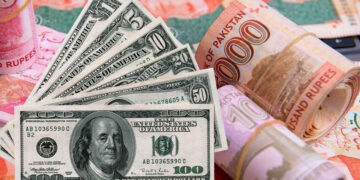Fuel prices have been a subject of concern for both policymakers and the general public in Pakistan as the rates of petroleum products are currently all-time record high.
The petrol prices were increased by Pakistani Rupees (PKR) 26.02 per litre and high-speed diesel by PKR 17.34 per litre, the second big rise in two weeks. The petrol in crisis-hit Pakistan will now be sold at PKR 333.38 per litre, while the high-speed diesel will cost PKR 329.18 per litre.
Petrol and electricity prices have rocketed in Pakistan due to recent economic reforms that have led to historic levels of inflation and high interest rates, putting pressure on ordinary people and businesses.
There are several factors that are contributing to the increasing fuel prices in Pakistan.
Global Oil Prices: Pakistan is highly dependent on imported oil to meet its energy needs. Therefore, fluctuations in global oil prices directly impact domestic fuel prices. Factors such as geopolitical tensions, supply and demand imbalances, and production cuts by oil-producing countries can cause oil prices to rise.
Exchange Rate Fluctuations: The exchange rate between the Pakistani Rupee (PKR) and the US Dollar (USD) plays a crucial role in determining fuel prices. When the PKR weakens against the USD, it makes oil imports more expensive, leading to higher fuel prices.
Taxes and Levies: The government imposes various taxes and levies on petroleum products. These taxes are a significant source of revenue for the government and can be adjusted to stabilize fuel prices or generate additional income.
Commuters who rely on personal vehicles or public transport face a direct hit to their wallets. As fuel prices rise, the cost of daily commutes and transportation for work or education increases, straining household budgets, due to fuel price hike.
Many businesses rely on transportation for the movement of goods and services. Rising fuel prices can lead to higher operating costs for businesses, which may either be absorbed or passed on to consumers in the form of price hikes. The agriculture sector, a significant contributor to Pakistan’s economy, relies heavily on fuel for machinery, irrigation, and transportation. Increased fuel costs can lead to reduced agricultural productivity and, subsequently, higher food prices.
Rising fuel prices in Pakistan are a complex issue with widespread implications. While they contribute to government revenues, they also burden the masses, particularly low-income individuals and small businesses.
Finding a balance between fiscal responsibility and safeguarding the welfare of the people remains a challenge for policymakers. Addressing this issue requires a multi-faceted approach that includes targeted subsidies, tax reforms, and investments in alternative energy sources to ensure a more sustainable and equitable energy future for Pakistan.





























